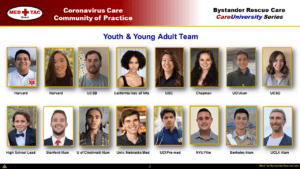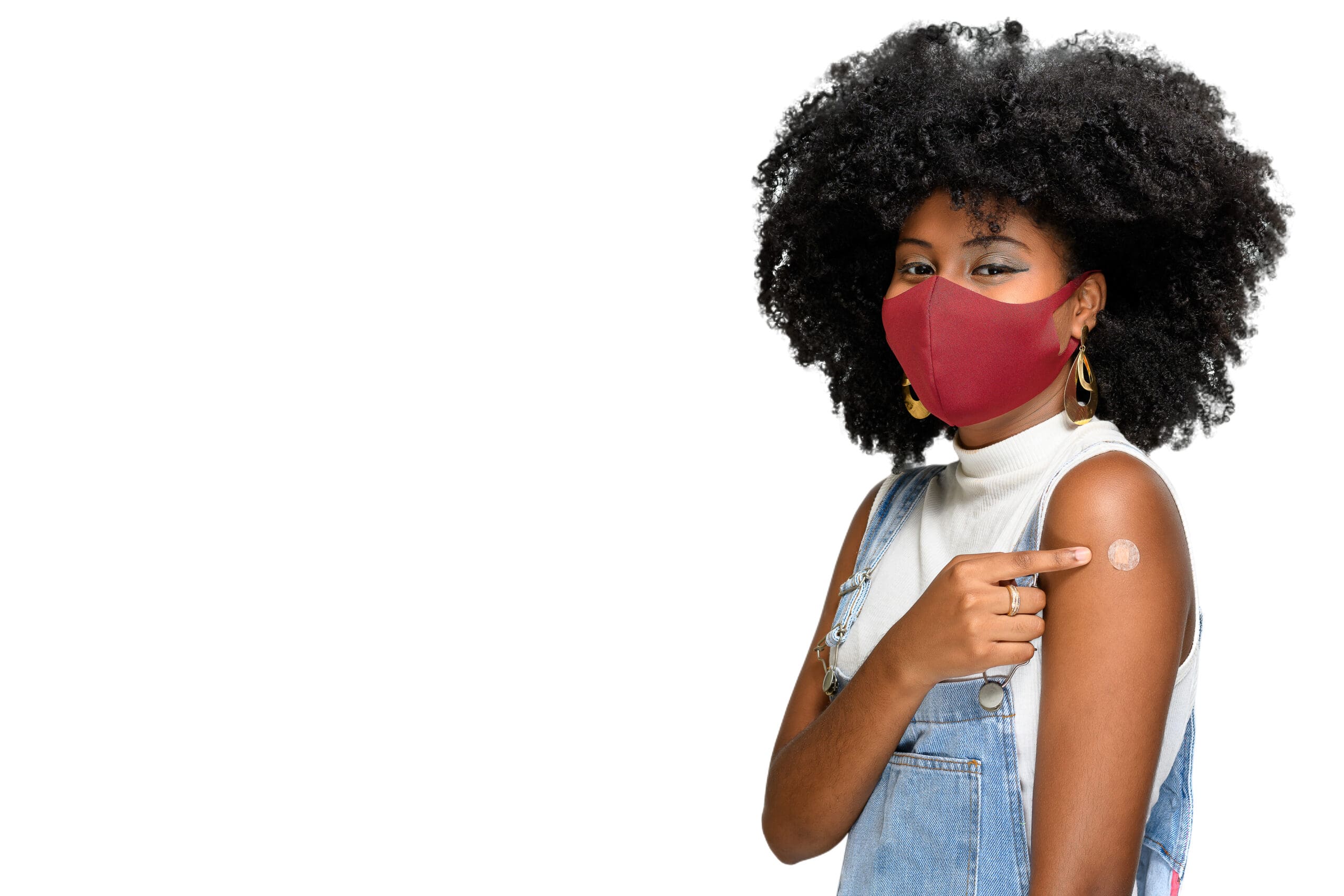“Take the shot…save a life…I did!” is the cheer made by high school and college students, young adults, and faculty from some of our leading schools and universities in video messages tackling vaccine hesitancy. The program is designed to help accelerate the vaccination rate of young friends and families to win the race to community immunity.
“Take the shot, save a life” was designed for youth and young adults to lead and serve in their communities. Student leaders who participate at high schools may even earn community service credit for their work and leadership in the program.
We are leveraging peer-to-peer messaging grounded in evidence-based science. We want to reach those who want answers to their questions about vaccines and hope to overcome their worries. We also want to educate those who are vaccine hesitant on how easy it is to book and receive the shot. The team believes the real power lies in the trust of families and friends who want to save their own lives and care about saving the lives of others.
‘Take the Shot’ Program Is Timely
The “Take the shot, save a life” program is being unveiled as we battle the COVID-19 Delta variant, which is much more contagious, more lethal and more likely to infect our youth and young adults than previous variants. Many young people don’t understand that they could suffer long-term brain fog, impacted athletic abilities and long-term organ damage from even mild COVID infections.
Nation-states and conspiracy theorists are making the problem even worse by sowing fear and spreading disinformation about COVID vaccines in the echo chamber of the internet. Compounding the problem is vaccine hesitancy among people of color, as well as young adults who feel less vulnerable yet can be super-spreaders.
The majority of those who have not yet been vaccinated are those who are likely to wait and see, those who are undecided and those who need easy access to vaccines. We call them the “movable middle.” They are not those who have definitely decided against vaccines. The vaccine hesitant are a great opportunity for community service impact by our young leaders.
Having the Vaccination Conversation
The expansion of vaccine eligibility to include those who are 12-15 years of age and the final FDA approval of the Pfizer mRNA vaccine is a great new opportunity for our youth, students and young adults to serve by encouraging families and friends to have the conversation about vaccines.

With the “Take the shot” program, college and high school students and grads are available to educate their peers on COVID-19 vaccines.
Although senior citizens have historically been the most vulnerable to COVID, most people are surprised to hear that there was a spring surge of hospitalizations in teenagers, with nearly one third requiring intensive care and 5% requiring ventilators. The Delta surge in late summer of 2021 overwhelmed many of our nations children’s hospitals. This is why we need a rapid increase in vaccinations among our youth and young adult population.
“Take the shot’s” rapid response team of college students, alumni and faculty from leading universities have developed an initiative that builds on an existing platform of family-targeted COVID safety solutions.
Participants may watch the “Take the shot” recorded videos online on their own without engaging the mentorship team, or they may sign up to be mentored by college students and young adults who are grounded in the CDC guidelines and peer-reviewed science vetted by physicians from leading medical centers. Our world-class team of coaches help prepare active participants, help them identify who they wish to serve and coach them through the process of helping others in their school, university, church, team or scout group to earn community service credits.
A short video produced by the team introduces “The Vaccination Conversation” and answers key questions of why vaccinate, why you and why now.
To dispel myths about vaccinations, our team of coaches and experts have produced a number of additional short FAQ videos and drill-down answers.
Our student leaders in high schools and colleges who want to serve in their communities will offer to play the videos and address key issues important to their friends after starting the conversation. They will even offer to help families book vaccinations or find a walk-in vaccination site if they wish.
The program grew out of our Coronavirus Care Community of practice launched when the COVID crisis hit New York and Italy in March of 2020 as an initiative of the Med Tac Bystander Rescue Care program focused on the leading causes of preventable deaths by emergencies.
Head, Heart, Hands and Voice:
The ultimate outcomes of our community service can be described in terms of the head, heart, hands and voice.
- Head – what do we want you to know? We want you to know about the benefits of vaccines and risk of viral variants. These lifesaving benefits greatly outweigh the short-term side effects of the vaccines.
- Heart – what do we want you to feel? The hope to overcome fear and hesitancy…and the joy of freedom vaccines give us.
- Hands – what do we want you to do? Vaccinate!
- Voice – what we want you to say to your friends and family? Your message to help them get vaccinated and to expand community immunity.
Why You and Why Now?
Our senior citizens are the most vulnerable to COVID, however, they are now the most vaccinated. The fastest growing group of hospital admissions and harm is the young… the young who are most likely to spread the disease without knowing it. Every age group has enormous benefits from community immunity.
In order to get back to a new normal, it is critical that we reach immunity in every community across the nation. The longer you wait, the greater risk you and your family bear. And the more likely we will have tougher viral variants to beat. The virus and the vaccines are in a life-and-death race; a race we can win. So, take the shot, save a life. We did.
Here are some comments on the importance of COVID vaccinations from the program’s youth and young adult leaders:
Sophia is an alumna of the California Institute of the Arts: “You don’t want to get long haul COVID. There are the dangers of brain fog. I am an actress and that’s my future and that’s what I want to do. So I need to make sure that I am being safe looking ahead for my future. I am also asthmatic. That’s my preexisting condition. So I want to make sure I am being COVID safe for myself, my family, and for others.”
Marcus is currently attending ESSEC Business School in Singapore: “I am incredibly excited to know that the vaccines work on all races…the Black community, the Native American Community, and all people of color…regardless of age…young and old…they are incredibly effective. I have had mine and except for some mild side effects, I am incredibly thankful that I am protected against COVID 19”.
Charlie is a Stanford alumni and former varsity football player: “The impact of Long Haul COVID is extremely important. As an athlete your cardiovascular health is critical to being able to train no matter what position or sport you play. Being able to put your body through endurance tests during the off-season training is critical to setting yourself up for success during the season.”
Jaime is a freshman medical student at the University of Nebraska: “I would say we are currently in a really important point in the pandemic and if you look at the data we can tell to your own health as well as the public out there is no reason to wait so I would encourage all of you to have the conversations to look at the data to share the information that you know and encourage everybody to get this vaccine as soon as possible. There’s really no reason to wait.”
Nick, an EMT and recent alumni of University of California Santa Barbara: “I just got my second dose yesterday and I’m feeling really good this morning. I have had zero effects and already been on a run this morning. I encourage anyone who is worried about side effects of the vaccine to just go ahead and do it. Even if you do have some side effects, they are going to be very minor and short-term. And at the end of the day it is a lot better and getting COVID. I encourage everyone to go out there vaccinated.”
Click here for more information on “Take the shot, save a life” program.
William Adcox is the chief security officer for the UT MD Anderson Cancer Center and UT-Health Chief of Police; Dr. Gregory Botz is a professor of anesthesiology and critical care and UT MD Anderson Cancer Center; Charles Denham III is a Junior Med Tac instructor; Dr. Charles Denham II is the chairman of the Texas Medical Institute of Technology.







